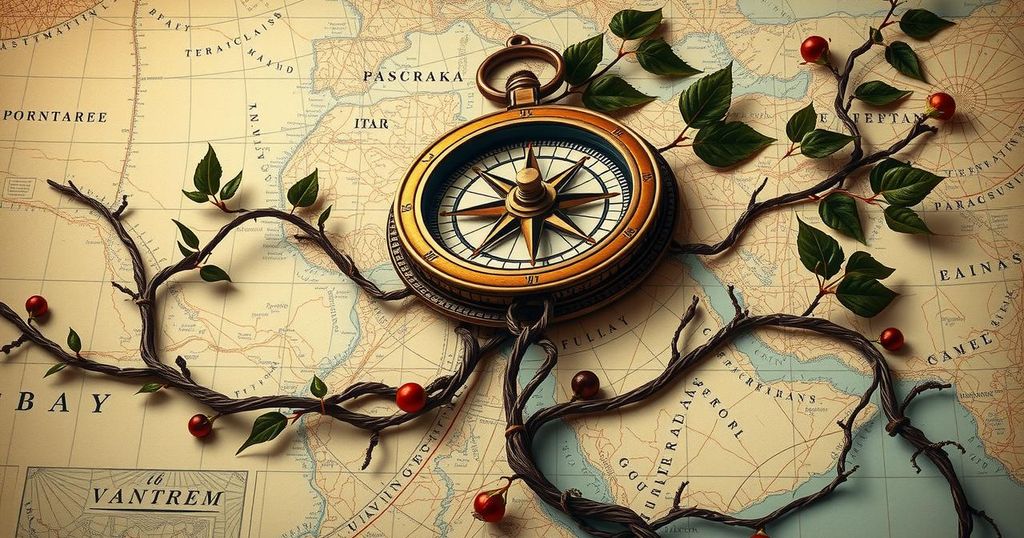Reexamining the Middle East’s Role in World War I through Wyrtzen’s Perspective
Jonathan Wyrtzen’s “Worldmaking in the Long Great War” reexamines the Middle East’s influence during World War I, challenging conventional narratives. Covering local struggles from 1911 to 1934, the book highlights the region’s active role in shaping modern political dynamics. Wyrtzen’s work illuminates the complexities of anti-colonial movements and re-establishes the importance of the Middle East in global history, making it essential reading for scholars and enthusiasts alike.
The Middle East has historically been neglected in World War I narratives, despite its significant long-term effects. However, a new wave of historical literature is highlighting the region’s critical role, correcting traditional misconceptions. Jonathan Wyrtzen’s book, “Worldmaking in the Long Great War: How Local and Colonial Struggles Shaped the Modern Middle East,” serves as a vital contribution to this rediscovery of the Middle East’s involvement in the war.
Wyrtzen presents World War I as a pivotal moment when various futures appeared possible for the Middle East, spanning 1911 to 1934 and encompassing a vast area from Morocco to Iran. His work goes beyond mainstream narratives by portraying the region as an active agent rather than a mere victim of European colonial ambitions, providing detailed accounts of events such as the Rif Wars, Kurdish revolts, and the Great Syrian Revolt.
The historical turmoil from that era resonates in contemporary conflicts, reflected in events such as Da’esh’s actions in 2013, which challenged the legacy of the Sykes-Picot Agreement. The memories of the Rif Republic continue to influence Morocco, illustrating the lasting impact of these early 20th-century struggles.
Wyrtzen dispels the notion that Dien Bien Phu marked the first decisive defeat of entrenched Western troops by indigenous forces, as shown by the Senussi victory at Gasr Bu Hadi in 1915 and various Arab victories during the Rif Wars against colonial powers. These events highlight earlier instances of successful resistance against colonialism.
Religious movements significantly motivated these anti-colonial efforts, with the Sheikh Said Rebellion in Anatolia drawing attention from historical figures like Winston Churchill. In Libya, the Senussi movement combined various Islamic practices to mount resistance against Italian forces. This illustrates a broader geopolitical struggle within the Middle East.
Wyrtzen’s thorough examination of French colonialism in Syria is particularly noteworthy, often lacking in English-language literature. While the narrative concerning Ibn Saud’s unification of Saudi Arabia is more familiar, Wyrtzen provides an effective retelling that adds depth to this aspect of history.
The book’s scope, while expansive, could further incorporate regions such as Somalia and Afghanistan, both of which played significant roles in the post-World War I landscape. In Afghanistan, the Third Anglo-Afghan War significant marked a stride towards independence, while the rebellion led by the “Mad Mullah” in Somalia showcased interwar resistance dynamics.
Wyrtzen’s work aligns with a historiographical shift that emphasizes the Middle East’s centrality in World War I, countering the dominant narrative of a peripheral role. For instance, Sean McMeekin’s “The Russian Origins of the First World War” highlights how Russian ambitions in the region foreshadowed broader conflicts.
Challenging romanticized views of the Middle East as a mere backdrop, Wyrtzen’s analysis reveals active local agency during the war. He meticulously examines diplomatic communications and archival documents, offering insights into how local actors influenced the modern political landscape of the region.
“Worldmaking in the Long Great War” is an essential read for scholars interested in colonial studies or those contemplating the historical implications of potential alternate paths in Middle Eastern history.
The historical narrative of the Middle East during World War I has often been overlooked, reducing its critical contributions to a mere footnote in larger global accounts. Recent literature, including Jonathan Wyrtzen’s “Worldmaking in the Long Great War,” aims to rectify this imbalance by providing a nuanced exploration of the region’s role and highlighting its complexities. This era saw significant local and colonial struggles that have shaped contemporary Middle Eastern geopolitics, warranting a re-examination of historical accounts and their implications today.
Jonathan Wyrtzen’s book critically reframes the discourse surrounding World War I and the Middle East, underscoring the active role local and colonial disputes played in shaping modern political dynamics. By challenging prevailing narratives that have marginalized the region, Wyrtzen opens a pivotal dialogue about the complexities of colonial resistance and the long-lasting consequences of early 20th-century events. This work is a vital addition for anyone seeking to understand the intricate historical tapestry of the Middle East during this transformative period.
Original Source: manaramagazine.org




Post Comment